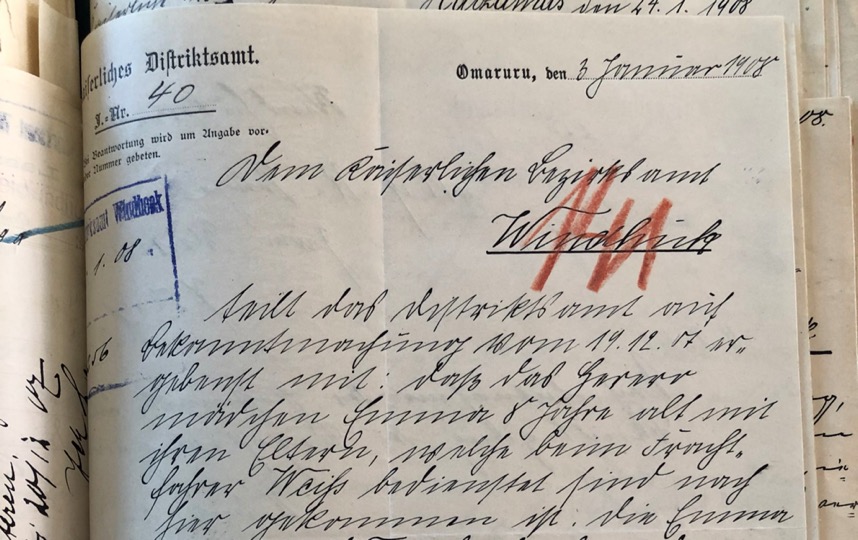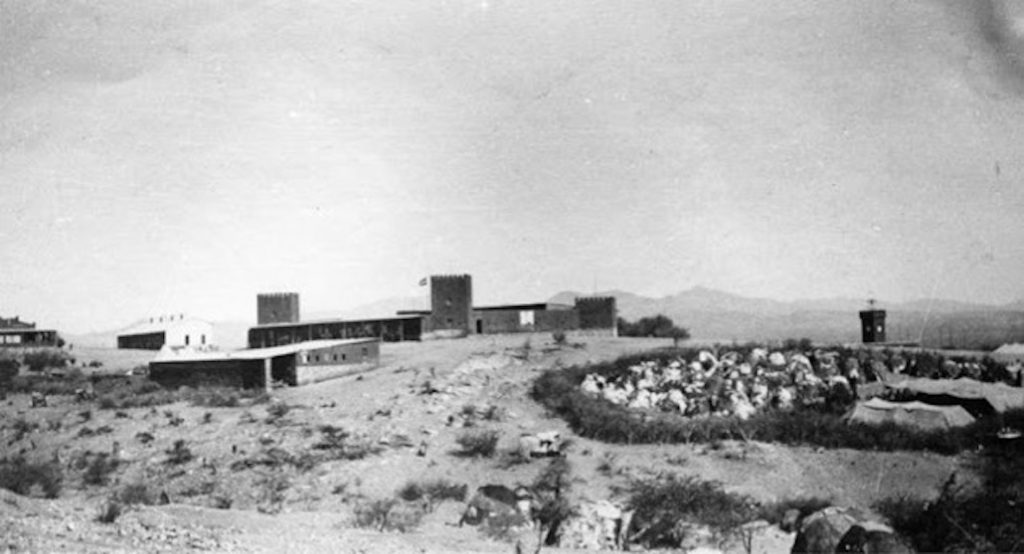Germans also separated children from their parents. In a previously unknown collection at the National Archives of Namibia in Windhoek, I recently discovered documents that confirm colonial authorities used family separation as a means of domination in German Southwest Africa (present-day Namibia), Germany’s first and only settlement colony.

A dispatch to the Omaruru District Commander, for instance, details the separation of Emma, an 8-year-old Herero girl, from her parents as they departed from the capital city of Windhoek. It concludes that “she ran after her parents since she belongs with her Omaruru family.” Emma’s fate remains a mystery to the present day.
Another collection exposes the bureaucratic extent of German settler-colonial practices in Namibia. In a folder of “native passports” (Paßmarken), I found several lists of all “employed prisoners-of-war.” These records include a person’s name, age, “tribal” affiliation, and the last-known location of their parents. In most cases, officials simply wrote “dead” (tot) with no additional information. Several colonial administrators remarked in documents that these efforts provided the imperial government an “effective means of controlling the local populations.”

After the arrival of German settlers in Namibia in 1884, colonial officials moved quickly to displace Africans from their traditional lands, first through negotiations and the establishment of so-called “protection treaties,” and later through force of arms. The most destructive effort began in 1904 when soldiers under the command of General Lothar von Trotha initiated the first genocide of the twentieth century against the Herero and Nama, the largest and most powerful communities in the colony.
In what historians now refer to as his “Annihilation Order,” Trotha decreed in October 1904 that:
The Herero are no longer German subjects [and] must now leave the country. If it refuses, I shall compel it do so with the [great cannon]. Any Herero found inside the German frontier, with or without a gun or cattle, will be executed. I shall spare neither women nor children. Such are my words to the Herero people.
Trotha’s actions resulted in the murder of approximately 60-80% and 25-35% of the Herero and Nama’s pre-1904 populations, respectively. The German colonial government also rounded-up entire families and placed them in concentration camps (Konzentrationlager), where thousands more died from exposure and inhumane treatment. In 1908, German authorities relocated survivors to segregated “native reservations” (Eingeborenenwerften), required them carry “native passports,” and forced them to rely on the colonial government for basic commodities and supplies.
Descendants of Herero and Nama victims continue to lobby Namibian and German political leaders for reparations and the return of their traditional homelands. Their appeals and legal efforts, however, have thus far warranted them few victories.
Any serious historian recognizes the importance of historical context and the necessity for evaluating the past on its own terms. At a time when high-profile media personalities invoke a skewed or blatantly false historical narrative to justify policy on a seemingly daily basis, I am wary of arguments that clumsily rely on unnuanced comparisons.
But professional responsibility does not abjure scholars the right to call attention to present-day human rights crises, from those fleeing systematic violence in Syria to the reported atrocious conditions and treatment of people in detention centers at the U.S. southern border. Academics in the humanities, in particular, dedicate their careers to the collection, examination, and comparison of diverse source materials in an effort to provide answers to complicated questions. Critical analysis, however, oftentimes leads to uncomfortable conclusions.
We can no longer comfort ourselves in a false logic that regards discriminatory practices against so-called “stateless” peoples as a unique aspect of German history or the distant past. It is incumbent for each of us to continue to learn about the plight of the rightless so as to identify the dangerous potentials of their condition. History does not repeat itself, but a critical evaluation of past events can at least provide us means to learn about the destructive capabilities of nationalism, racism, and collective fears of a so-called “Other.”
The tenets of liberal democracy necessitate that we contemplate the lessons of history. A failure to do so imperils the standing of everyone, but most especially those who have nothing left except for what Hannah Arendt pointedly identifies as their “abstract nakedness of being human.”
Dr. Adam A. Blackler is an assistant professor of history at the University of Wyoming. His current book project, entitled Heathens, “Hottentots,” and Heimat: Southwest Africa and the Boundaries of German Identity, 1842-1915, explores the transnational dimensions of German colonialism, race, and genocide in German Southwest Africa. He is presently co-editing After the Imperialist Imagination: A Quarter Century of Research on Global Germany and Its Legacies, an anthology on German interactions across the globe (Peter Lang, 2020). He will publish “Settler-Colonialism and Its Eliminatory Repercussions in the Nineteenth Century” in A Cultural History of Genocide: The Long Nineteenth Century (Bloomsbury, 2020).
Collection citation:
Archives:
National Archives of Namibia (NAN) – Windhoek, Namibia
Collections:
Kaislerliches Bizirksamt Windhoek (BWI)
Zentralbureau des Kaiserlichen Gouvernements (ZBU)

Comments